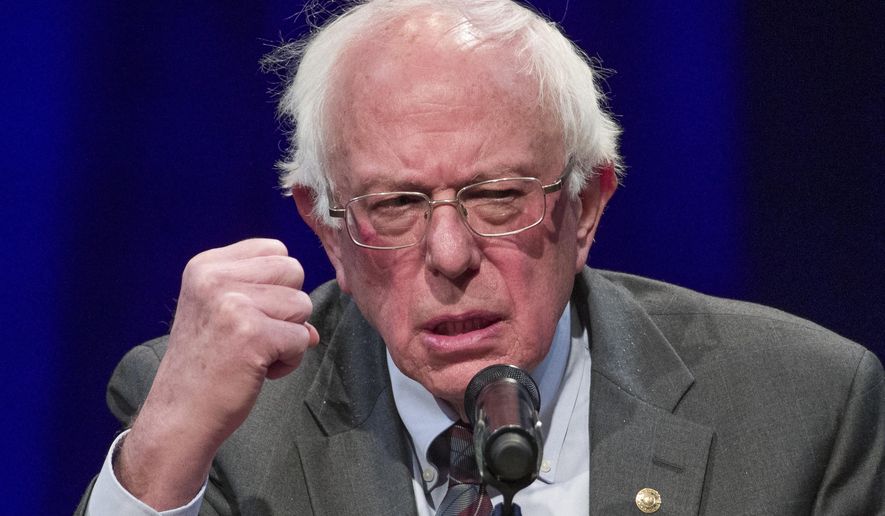OPINION:
After attempting to take credit for Amazon’s decision to change its employee pay scales, Vermont Sen. Bernie Sanders, an Independent, recently put a new group of job creators in his crosshairs. This time he’s aiming at Walmart and other large corporations with a new bill named the “Stop Walmart Act.”
The bill, co-sponsored by Rep. Ro Khanna, California Democrat, would prevent large companies from buying back stock unless they pay all employees — part-time, contractors and franchise employees included — at least $15 an hour. These firms would also have to provide workers seven days of paid sick leave and limit CEO compensation to no more than 150 times the median employee pay. There appears to be no attempt to account for cost of living variations these companies take into account when making these decisions themselves.
Still, what is good for the goose is apparently not good for the gander, according to the Vermont self-described democratic socialist.
If Mr. Sanders wants everyone to make at least $15 an hour — the “living wage,” as he claims — then why doesn’t he force his union allies to pay their employees this amount? Unions have been called out in the past for not paying the lauded $15 an hour to its own employees and contractors.
The Daily Caller reported in 2015 that “Working America,” one of the political arms of the AFL-CIO, advertised a job listing of $12.25 to protest for a $15 minimum wage. In 2016, Fight for $15 organizers and field staff even protested the SEIU, demanding the union pay them $15 an hour.
Further, unions have a track record of writing exemptions into the very $15 minimum wage mandates for which they advocate. SeaTac in Washington state was the first city to mandate a $15 minimum wage and was the first to write in an exemption for unionized workers.
Walmart, on the other hand, has made efforts to improve worker conditions by recently raising its minimum wage to $11 an hour and offering employees opportunities to advance and earn higher pay. “We have increased our starting wages by more than 50 percent in the last three years and currently have an average hourly total compensation of more than $17.50 an hour,” Walmart said in a statement to CNN in response to Mr. Sanders’ bill. “At the same time, we’ve also added new benefits like paid time off, advanced job training, paid family leave and college for $1 a day.”
Those measured changes don’t seem to matter to the senator who led a public pressure campaign against Amazon and other large employers. Mr. Sanders’ Stop BEZOS Act earlier this year called for levying a tax on large companies equal to the value of the public benefits that their workers receive.
Only five weeks after Mr. Sanders launched the campaign, Amazon announced it would raise its minimum wage to $15 an hour. However, to make up the difference, the company also eliminated performance bonuses and restricted stock awards for hourly workers.
Still, Mr. Sanders was happy with the outcome because it validated his tactics and his living wage talking point. “Today I want to give credit where credit is due, I want to congratulate Mr. Bezos for doing exactly the right thing,” Mr. Sanders said at a news conference. He even tried to commandeer Amazon’s call for other companies to follow its lead: “I very much look forward to working with [Bezos] in this area.”
Some Amazon employees think the lost benefits will result in thousands of dollars in lower overall compensation annually — even though they are receiving an increased hourly wage. One employee provided calculations to WIRED that indicated an annual loss of $1,400 per year.
Washington’s best intentions to give workers financial stability can backfire as businesses adjust to comply with sweeping regulations such as these proposed by Mr. Sanders and still remain in business. Last year, major fast food companies like McDonald’s and Wendy’s indicated their intent to replace workers with automated kiosks. Former McDonald’s U.S. CEO Ed Rensi said the move was in response to the push for a minimum wage increase to $15 an hour.
Career politicians in Washington like Mr. Sanders apparently believe that they know better how to run a dynamic, multinational corporation and how these complex organizations should structure their employee compensation. Walmart employs 1.5 million people in the United States, and Mr. Sanders supposes that he knows what’s best for them.
If Mr. Sanders wants to create a $15 minimum wage for large companies, perhaps he should redirect his megaphone toward his union allies, and enforce the same wage and benefits that Big Labor publicly preach but fail to privately practice.
• F. Vincent Vernuccio is a senior fellow at the Mackinac Center for Public Policy.




Please read our comment policy before commenting.